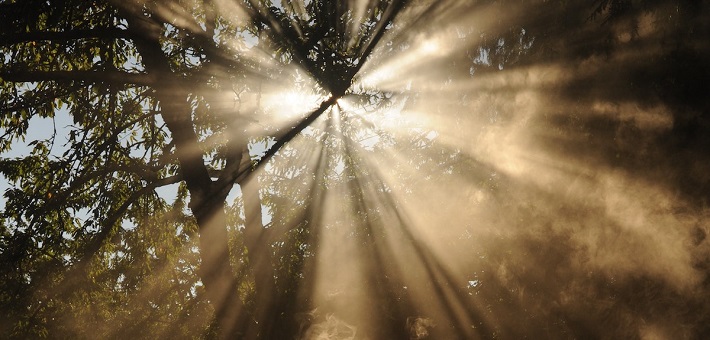Commentary on Psalm 8
This psalm is a hymn of praise for God’s love and care for humans. God created humanity with free will and gave them responsibility and dignity. Like many songs, the psalm begins and ends with the same phrase: “O LORD, our Sovereign, how majestic is your name in all the earth!” (verses 1 and 9), known as an inclusio, a type of bookend framing the psalm.
God has created the universe to reflect God’s glory, from the sky to the earth to the sea, and God has bestowed God’s image on humans.
Verse 2 does not have an obvious flow within the psalm, but likely refers to God’s power over that which threatens God’s creation. Even from the most vulnerable of humanity, God’s greatness is proclaimed, creating stability.
The psalmist marvels at God’s beauty, revealed through creation, particularly the moon and stars (verse 3), and wonders why such a God would care so deeply for humanity. How could a God capable of creating the sky and the weather also be loving and tender with humankind?
God has honored humanity by giving them responsibility over the earth (verses 5-8). God has trusted humanity to take care of the animals, the food supply, and the environment. Building on sharing in the image of God, and thereby the knowledge of God, humans will shepherd what lives on earth, participating in God’s love and care, which they both receive and offer as part of that image.
Psalm 8 seems to be aware of the unspoken possibility that God could have created humanity without free will, self-awareness, capability, or trusting relationship. Knowing what could have been makes what God did all the more precious. The psalmist treasures God’s creation as the gift that it is, as the gesture of love that it is.
The inclusio of the psalm begins with “O LORD, our Sovereign,” pairing celebration with acknowledgement of God’s sovereignty and leadership over humanity. Yes, humanity has been created with resplendence, and yes God trusts humanity to rule the earth. This freedom, however, is a responsibility rooted in worship of God in which right living is an expression of God’s love. Prostration and joy partner hand in hand.
Reading this psalm in the midst of daily mass shootings, multiple wars, ever-complexifying global pandemic, and looming climate crisis does not sit well. Humanity seems to have become complicit with all that God has given and abandoned its responsibility to care for the earth. Humanity has lost sight of the splendor with which God made them. What God made to reflect God’s majesty has become a horror scene. We have turned on each other. We have turned on our planet. We have turned on God.
- What does it mean that the darling coos of our children were meant to manifest safety, and yet they are being shot in their classrooms?
- What does it mean that we were meant to find the tenderness of God in the beauty of our planet, and yet we are destroying it and all its creatures with our greed for more and more resources?
- What does it mean that God trusted the animals in our care, and yet many of them haven’t survived because of our neglect, or worse, our abuse?
- What does it mean that we were created in the image of God? Out of all that God could have chosen to love, what does it mean that God loves humankind?
Proclamation from this psalm invites deep reflection of these questions, remembering God’s design for humankind in Genesis 1:27-30—“God created humankind in his image, in the image of God he created in them; male and female he created them. God blessed them, and God said to them, ‘be fruitful and multiply, and fill the earth and subdue it; and have dominion over the fish of the sea and over the birds of the air and over every living thing that moves upon the earth’” (Genesis 1:27-28).
We are the bearers of God’s image, blessed by God, and called to care for the earth. How do we live in faithfulness in this moment? How do we address climate crisis as God’s hands and feet in the world? How do we engage in our food chain and address access to food as those God has commissioned to care for all that live on earth? Are we sure God is still confident in our ability to fulfill this calling?
When we survey the heavens and the earth, what do we see? Who are we to that which we see, and what is it to us? How does God’s creation reveal God’s self to us? How does God’s creation reveal God’s love for us?
And how do the answers to those questions challenge us to transform the way we live in our present contexts? How can we more faithfully bear the image of God in the way we care for one another? How can we more faithfully bear the image of God in the way we care for the earth and its living things? How does recognizing the tenderness of God’s love for us in that which we see invite us to new ways of living and relating?
Finally, what does “dominion” really mean? Does it mean control over the earth, with authority to use the earth however we desire? Does it mean stewardship so that the living things on the earth may flourish? Or does it mean something else entirely? How have we conflated dominion with entitlement such that we have confused the gospel with our own intentions, and blamed our behavior on God?
What would it look like to see God’s creation—all of it—with wonder and let it transform us?


June 12, 2022